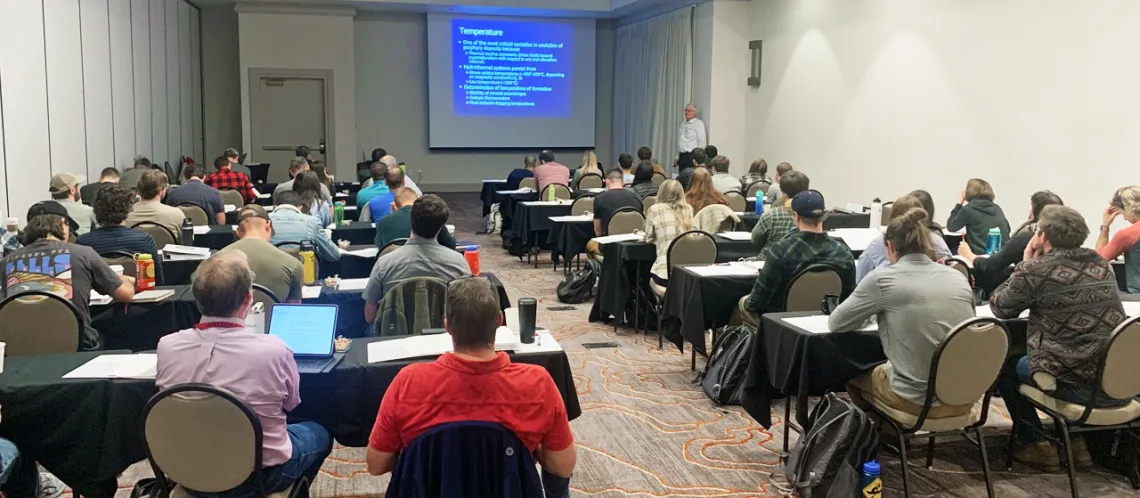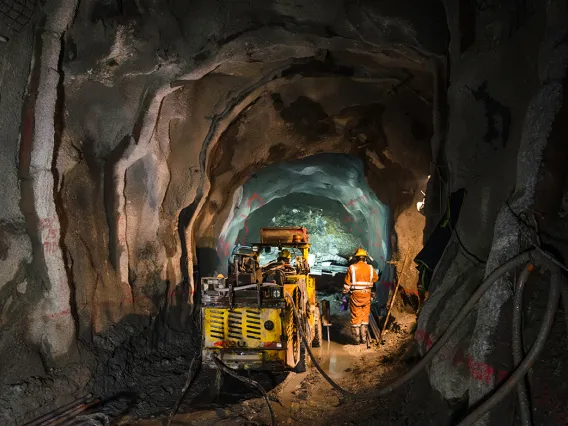A flexible one-year masters degree focused on mineral resource geology

From discovery and production to mine closure and policy, the program covers technical and business aspects of the breadth of geology applied to mineral resources

Education and training for students and professionals interested in the gamut of mineral resources, preparing them for global career-track positions leading to management opportunities.

30 credit hours of a highly customizable selection of master's level courses, including a cohort project or internship
Tailor Your Education to Your Career Goals
Coursework for the Professional Science Master's in Economic Geology (PSM/EG) program comprises semester-long classes, 10-day field courses, and short courses. Pick from over two dozen eligible courses to best align your interests and career goals. Most courses are available remotely. The program is intended to take two semesters and involves a cohort-based project or an internship. PSM students interested in doing a master's thesis can apply to the MS program in Geosciences for a second year.
The mining industry and related careers rely on geologists' contributions from various areas of expertise throughout the mining life cycle. Here are just some examples of where our program can take you.
I am interested in

Learning more
... gaining a general background in mineral resources to explore opportunities or to build additional professional skills

Exploration geology
... pursue a career in discovering new ore deposits, and I would enjoy working in teams dominated by geoscientists.

Development geology
... test the feasibility of deposits, bring newly discovered deposits into production, and expand existing operations, and I would enjoy being a member of a multi-disciplinary project team.

Mine geology
... contribute to the efficient mining and processing of ore at operating mines, for example as a member of the professional staff at an operating mine.

Environmental geology
... apply geologic science to the environmental aspects of the mining industry, such as mine permitting or monitoring water quality and supply, for example working in an environmental team at a mine site, as corporate environmental staff, or at a consulting firm.
PSMEG Curriculum
The Professional Science Master's in Economic Geology emphasizes both basic and applied science, starting with a grounding in fundamental geosciences and allied fields but extending to applied aspects in engineering, social sciences, and business, among others.
Students can typically choose from among courses formulated for general background or emphasizing exploration, mining, environment, law, health and safety, or business and policy:
Regardless of the emphasis area, we recommend completing courses in all areas. This flexibility allows students to balance coursework according to their career aspirations and personal interests. We believe this interdisciplinary approach will enrich your education and equip you with a well-rounded skill set, essential for a successful career in the mineral industry.
Application Process and Deadlines
Applications are accepted once each academic year to the degree programs (the certificate is twice per year). The next admissions cycle is for Fall 2026, with classes beginning in mid-August—general requirements for admission to the University of Arizona are on the website of the Department of Geosciences.
Candidates interested in applying to the PSM/EG must complete the following two steps:
- Submit an Application to the U of A Graduate College. You must apply online (see instructions below) with the Graduate College, send them your official test scores (if required), and pay your application fee to them.
How to apply to grad college:
- Create a GradApp account
- Complete your GradApp profile under "My Account".
- Select "Apply to a Program" from the sidebar.
- Select "University of Arizona - Main" under "Campus" and "Tucson" under "Location".
- Choose "Degree Seeking" under the application type and "Economic Geology (PSM)" under the program of study.
- Choose the semester during which you wish to enter the program.
- Your application should now be initiated under "My Active Applications."
- Submit an Application to the Department of Geosciences.
Frequently Asked Questions
Ideal candidates have a bachelor's degree in geoscience or a related discipline, work in the minerals industry and seek further education to advance their careers and compete globally.
Minimum Requirements
- Potential Students must have completed an undergraduate degree in geology or a related field in order to apply.
- Applicants who do not have a degree from an English-speaking university must demonstrate proficiency in English.
- No GRE exam is required for admission to this program, but submission of transcripts and letters of recommendation is required.
The program requires a minimum of 30 credit hours in a Master’s curriculum. For students focused entirely on completing the degree, it can be completed in two semesters, however flexibility is available to pursue the degree over a somewhat longer period of time for those who are working. For students interested in completing a master's thesis beyond the PSM requirements, application to the MS program is required toward the end of the first year (i.e., two years). If interested PSM students can also apply directly to the PhD program.
The PSMEG is fundamentally a science curriculum, but course requirements differ from those in an MS program. A formal thesis is not required for the PSMEG program, but students are required to complete a cohort project or internship that will count towards the Master’s Report (Pre-publication) (GEOS 909) or Thesis (GEOS 910).
Candidates are usually sponsored by their employers or funded by the student's personal resources. The Department of Geosciences offers no departmental support. Limited scholarships and funding may be available; please contact the LPEG faculty for more details.
The results of the project will be presented in the form of both a written report and a presentation (talk or poster) in a public forum. Students coming from industry are encouraged to bring the topic of the research project with them, potentially building on work they completed on the job. Requirements for most students can be satisfied either by an project-focused internship or a cohort-specific project developed by the faculty in collaboration with industry or other sponsored research.
